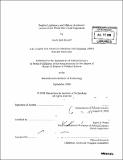| dc.contributor.advisor | Barry R. Posen. | en_US |
| dc.contributor.author | Russell, Jacob Hale | en_US |
| dc.contributor.other | Massachusetts Institute of Technology. Dept. of Political Science. | en_US |
| dc.date.accessioned | 2010-03-25T14:58:32Z | |
| dc.date.available | 2010-03-25T14:58:32Z | |
| dc.date.copyright | 2008 | en_US |
| dc.date.issued | 2008 | en_US |
| dc.identifier.uri | http://hdl.handle.net/1721.1/53082 | |
| dc.description | Thesis (S.M.)--Massachusetts Institute of Technology, Dept. of Political Science, 2008. | en_US |
| dc.description | Includes bibliographical references. | en_US |
| dc.description.abstract | This thesis argues that regime legitimacy creates military resilience. A regime is legitimate when its constituents believe-whether because of ideological solidarity, patriotism, nationalism, or good governance-that a government has the right to exercise authority in its regime. Military resilience, which contributes to military effectiveness, refers to the willingness of troops to stay committed in combat. In modern war, dispersion of forces creates the need for a very high degree of troop commitment, making resilience more important than in previous forms of warfare. Resilient units do not disintegrate through desertion, and furthermore commit themselves actively under fire. In arguing that legitimacy matters, this thesis revives a debate between two theories of military resilience. The first school, which comes out of the tradition of the mass army, holds that broad attributes like legitimacy, patriotism, and nationalism are crucial to resilience. In recent political science, a second school has been significantly more influential; these scholars argue that factors like small-unit cohesion and professionalism are the key explanatory variables for military resilience. Settling the debate between these competing methods of generating resilience is critical to effective army building. This thesis strongly supports a revival of the first school of thought, based on the evidence from two cases where legitimacy experienced a sudden shock. The first case examines the military resilience of foreign legions forced to fight for Nazi Germany in World War II. | en_US |
| dc.description.abstract | (cont.) It finds that those units were rarely resilient, even given otherwise similar conditions to German units, and what little resilience existed can be explained primarily through patriotism to soldiers' original homelands. The second case examines the Yugoslav People's Army during and after the disintegration of federated Yugoslavia in the 1990s. The evidence suggests that the army lacked resilience, experiencing mass desertion, when fighting for a disintegrated regime. It regained in resilience when it was reconstituted as a nationalist Serbian army in 1992. | en_US |
| dc.description.statementofresponsibility | by Jacob Hale Russell. | en_US |
| dc.format.extent | 62 leaves | en_US |
| dc.language.iso | eng | en_US |
| dc.publisher | Massachusetts Institute of Technology | en_US |
| dc.rights | M.I.T. theses are protected by
copyright. They may be viewed from this source for any purpose, but
reproduction or distribution in any format is prohibited without written
permission. See provided URL for inquiries about permission. | en_US |
| dc.rights.uri | http://dspace.mit.edu/handle/1721.1/7582 | en_US |
| dc.subject | Political Science. | en_US |
| dc.title | Regime legitimacy and military resilience : lessons from World War II and Yugoslavia | en_US |
| dc.type | Thesis | en_US |
| dc.description.degree | S.M. | en_US |
| dc.contributor.department | Massachusetts Institute of Technology. Department of Political Science | |
| dc.identifier.oclc | 501989696 | en_US |
